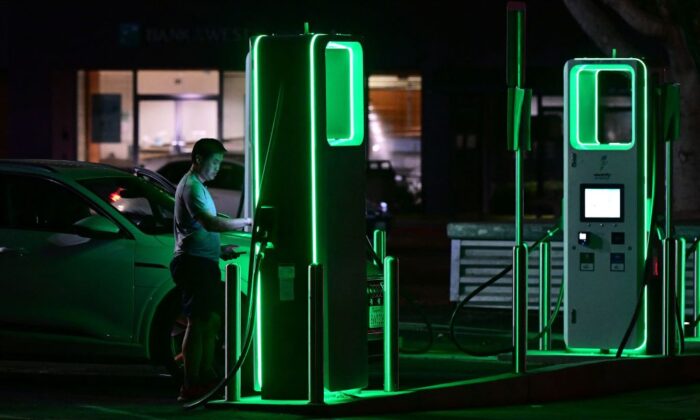


Commentary
The climate alarmists who have tried to foist electric cars and renewable energy on consumers have endured a number of setbacks in 2023. There are likely more to come.
First, consumers are finding that the distances advertised for EV charges are overstated. While generally advertised as going "between 100 and 300 miles," that range varies significantly with the weather. The American Automobile Association (AAA) found ranges can drop as much as 12 percent when temperatures are just 20°F and 4 percent when temperatures are 95°F. (The range drops as much as 17 percent when the driver turns on air conditioning.) Even driving into a headwind can adversely affect range.
We wrote back in April how swappable battery technology—whereby cars pull into a "swap station" and have their drained battery replaced in moments, which is about as much time as a gasoline fill-up—is far superior to the costly, slow, for example, Tesla "fast charger" station, which still takes 20 minutes, and could be built on the footprint of, or next to, gasoline stations without building multiple charging stations. In Japan, an experiment is underway to charge EVs wirelessly as they move slowly or are stopped at traffic signals.
Second, consumers are discovering the humongous cost of replacing electric vehicle batteries. One unfortunate Canadian, a one-time electric vehicle (EV) enthusiast, for example, found he was faced with a CA$50,000 (US$36,750) bill to replace his car's battery shortly after the warranty expired.
Finally, generous tax credits have artificially increased demand. Those credits expire in 2032, but are likely to distort the automobile market for years to come.
A Step Back From the Brave New World
It should come as no surprise, then, that major car makers have all stepped back from their once aggressive plans to go "all-electric."Related Stories
It was only a few years ago that the media and the political class were pushing electric cars and alternative energy. Seven years ago, in 2016, almost to the day, Tom Steyer, a private equity investor who made his fortune pushing "green" energy investments, was on the CNN show hosted by Fareed Zakaria touting what he said were the “moral, intellectual and economic leadership” advantages inherent in the "green energy" in which he was so heavily invested.
My, how things have changed. In October, Honda and General Motors announced that they had scrapped a $5 billion plan to jointly develop more inexpensive EVs. GM also withdrew its guidance for 2024. Even EV industry leader Tesla has rolled back its expectations as the market has cooled.
The early EV adopters are similar t0 the people who stand in line waiting to buy the latest iPhone. The rest of us are looking at the technology with jaundiced eyes. Not only are the vehicles expensive relative to their internal combustion engine counterparts but also they're more challenging to own because of range anxiety, (i.e., the inability to assess how far an EV can go) and problems with charging because of broken charging devices, and their risk of catastrophic fires. Consumers have stepped away from EVs, even as their political leaders insist they adopt them and with strict deadlines to do so.
Former Toyota CEO Akio Toyoda, who had long been a sceptic of EVs and resigned over the company's desire to pursue them, has been largely vindicated by the marketplace. Lawmakers may try to counteract that, but they do so at their peril.
The Way Forward
One of my favorite management quotes is from Peter Drucker, who said, "Culture eats strategy for breakfast." The strategy of elected officials and other government leaders is to move consumers to EVs and to do so in short order, about a decade. But the technology really isn't "there" yet. More importantly, neither is the the culture. It will be important, first, for government to arrive at a consensus among its citizens—if it can—that the public supports a move to EVs. Then, the technology, or technologies, will need to be perfected.But forcing EV adoption by a top-down dictate that ignores market realities will be rightly rejected.


